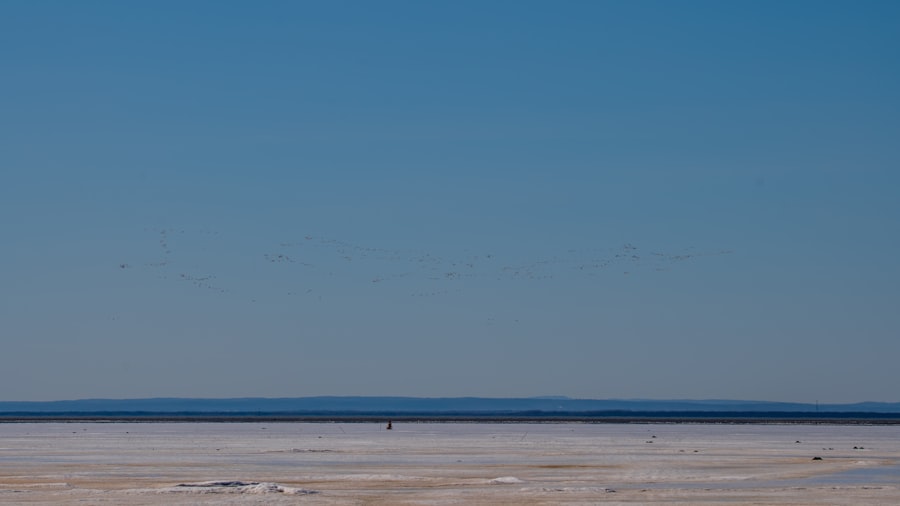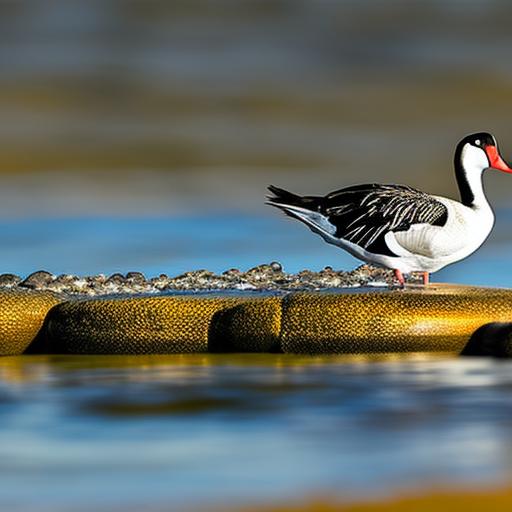Geese are beautiful creatures that are often found near bodies of water, including beaches. While their presence can be charming, it can also pose a problem for beachgoers and the environment. Geese are attracted to beaches for various reasons, including the availability of food and open spaces. However, their presence can lead to negative consequences that need to be addressed.
Key Takeaways
- Geese on the beach can cause negative impacts on the environment and beachgoers.
- Understanding the behavior of geese can help prevent them from landing on the beach.
- Preventing geese from landing on the beach can be achieved through various methods, including creating a bird-free zone and using decoys and deterrents.
- Cleaning up food scraps and trash is important in deterring geese from the beach.
- Working with local authorities is crucial in managing geese populations and promoting beach conservation.
Understanding the behavior of geese
Geese are social animals that often travel in flocks. They are attracted to beaches because they provide open spaces for them to rest and feed. Beaches also offer a variety of food sources, such as grass and insects, which geese find appealing. Additionally, geese are drawn to beaches because they provide a safe haven from predators.
To prevent geese from landing on the beach, their behavior can be modified through various methods. One effective method is the use of deterrents, such as loud noises or visual stimuli, to scare them away. Another approach is to create a bird-free zone on the beach where geese are not allowed to land. By understanding the behavior of geese and implementing these strategies, their presence on the beach can be minimized.
The negative impact of geese on the beach environment
While geese may seem harmless, their presence on the beach can have negative consequences for the environment. Geese produce large amounts of waste, which can contaminate the water and soil. This waste contains high levels of nitrogen and phosphorus, which can lead to algal blooms and oxygen depletion in the water.
Furthermore, geese can disrupt the natural balance of ecosystems by consuming large quantities of vegetation. This can lead to a decrease in plant diversity and negatively impact other wildlife that rely on these plants for food and shelter. Geese can also damage beach infrastructure, such as boardwalks and grassy areas, through their feeding and nesting habits.
Tips for preventing geese from landing on the beach
Preventing geese from landing on the beach requires proactive measures. One effective tip is to create a physical barrier, such as a fence or netting, to prevent geese from accessing the beach. Another tip is to use decoys or other visual deterrents, such as scarecrows or reflective tape, to scare geese away.
It is also important to clean up food scraps and trash on the beach, as these can attract geese. By removing these food sources, geese will be less likely to land on the beach in search of a meal. Additionally, educating the public about the harms of feeding geese can help reduce their population and prevent them from becoming dependent on human food sources.
Creating a bird-free zone on the beach
Creating a bird-free zone on the beach can have numerous benefits. It provides a safe space for other wildlife and reduces the negative impact of geese on the environment. To create a bird-free zone, it is important to clearly mark the area and enforce regulations that prohibit geese from landing or nesting in that area.
This can be done through signage, physical barriers, and regular monitoring by beach authorities. By creating a designated area where geese are not allowed, it ensures that other beachgoers can enjoy their time without being disturbed by geese or their waste.
Using decoys and other deterrents to scare geese away

Decoys and other deterrents can be effective in scaring geese away from the beach. One popular method is using decoy predators, such as fake owls or coyotes, to create a sense of danger for the geese. These decoys should be moved regularly to maintain their effectiveness.
Other deterrents include loud noises, such as air horns or whistles, which can startle geese and make them uncomfortable. Visual deterrents, such as reflective tape or scarecrows, can also be effective in deterring geese from landing on the beach. By using a combination of these methods, geese can be discouraged from staying on the beach.
The importance of cleaning up food scraps and trash
Cleaning up food scraps and trash on the beach is crucial in preventing geese from landing. Geese are attracted to beaches because they provide a source of food, such as discarded snacks or picnic leftovers. By removing these food sources, geese will be less likely to land on the beach in search of a meal.
Additionally, cleaning up trash is important for the overall health of the beach ecosystem. Trash can be harmful to wildlife and can pollute the water and soil. By keeping the beach clean, it creates a healthier environment for both humans and wildlife.
Educating the public about the harms of feeding geese
Educating the public about the harms of feeding geese is essential in preventing their population from increasing and causing harm to the environment. Many people enjoy feeding geese because they find it entertaining or believe they are helping them. However, feeding geese can lead to an increase in their population and cause them to become dependent on human food sources.
Feeding geese can also lead to aggressive behavior towards humans and other wildlife. By educating the public about these negative consequences, it encourages responsible behavior and discourages feeding geese. This can be done through signage, educational programs, and social media campaigns.
Working with local authorities to manage geese populations
Managing geese populations requires collaboration with local authorities. They have the power to enforce regulations and implement strategies to prevent geese from landing on the beach. Local authorities can work with wildlife experts to develop management plans that are effective in reducing the presence of geese on the beach.
Additionally, local authorities can provide resources and support for educational programs and initiatives aimed at preventing geese from landing on the beach. By working together, beach conservation efforts can be more successful in protecting the environment and ensuring a positive experience for beachgoers.
Conclusion and future considerations for beach conservation
In conclusion, the presence of geese on the beach can pose a problem for both beachgoers and the environment. Geese are attracted to beaches because of the availability of food and open spaces. However, their presence can lead to negative consequences, such as water contamination and disruption of ecosystems.
Preventing geese from landing on the beach requires proactive measures, such as creating physical barriers and using deterrents. It is also important to clean up food scraps and trash on the beach, as these can attract geese. Educating the public about the harms of feeding geese and working with local authorities are also crucial in managing geese populations.
Beach conservation is an ongoing effort that requires continued attention and action. By implementing these strategies and raising awareness about the negative impact of geese on the beach environment, we can ensure that beaches remain a safe and enjoyable place for both humans and wildlife.
If you’re interested in learning more about geese and their behavior, you might find this article on “What is the Incubation Period for Goose Eggs?” from Poultry Wizard quite fascinating. However, if you’re specifically looking for ways to keep geese off the beach, you may want to check out their related article on “Can Geese Eat Chicken Feed?” which provides insights into geese feeding habits and how it can be used as a deterrent.
FAQs
What are the reasons for keeping geese off the beach?
Geese can cause damage to the beach ecosystem, create unsanitary conditions, and pose a threat to human safety.
What are some effective ways to keep geese off the beach?
Some effective ways to keep geese off the beach include using decoys, installing fencing or netting, using noise deterrents, and implementing habitat modification.
What are some natural ways to keep geese off the beach?
Some natural ways to keep geese off the beach include planting vegetation that geese do not like, using natural predators such as dogs or hawks, and creating barriers with natural materials such as rocks or driftwood.
What are the risks of using chemical deterrents to keep geese off the beach?
Chemical deterrents can be harmful to the environment and other wildlife, and may also pose a risk to human health if not used properly.
What should I do if I encounter a goose on the beach?
If you encounter a goose on the beach, it is best to keep a safe distance and avoid approaching or feeding the bird. If the goose appears injured or in distress, contact a local wildlife rehabilitation center for assistance.
Meet Walter, the feathered-friend fanatic of Florida! Nestled in the sunshine state, Walter struts through life with his feathered companions, clucking his way to happiness. With a coop that’s fancier than a five-star hotel, he’s the Don Juan of the chicken world. When he’s not teaching his hens to do the cha-cha, you’ll find him in a heated debate with his prized rooster, Sir Clucks-a-Lot. Walter’s poultry passion is no yolk; he’s the sunny-side-up guy you never knew you needed in your flock of friends!







